高中英语词汇学习需要掌握的十二个概念课件(61张ppt)
文档属性
| 名称 | 高中英语词汇学习需要掌握的十二个概念课件(61张ppt) |  | |
| 格式 | zip | ||
| 文件大小 | 829.3KB | ||
| 资源类型 | 教案 | ||
| 版本资源 | 通用版 | ||
| 科目 | 英语 | ||
| 更新时间 | 2020-10-10 08:39:35 | ||
图片预览

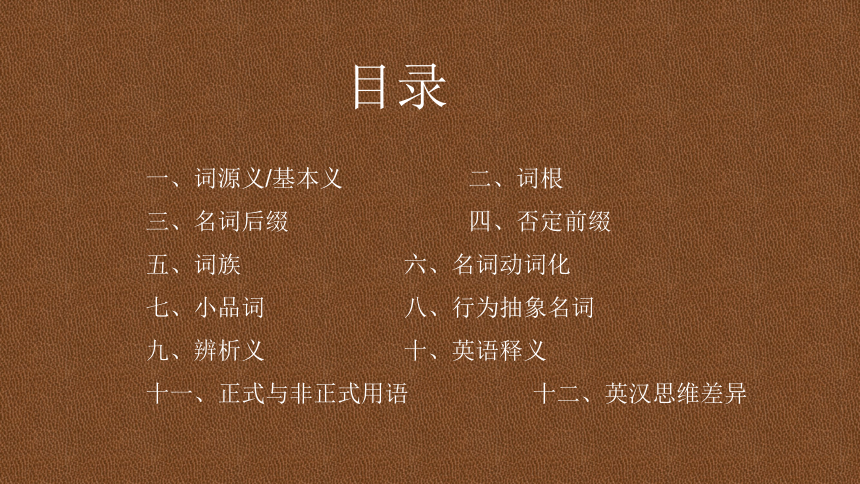

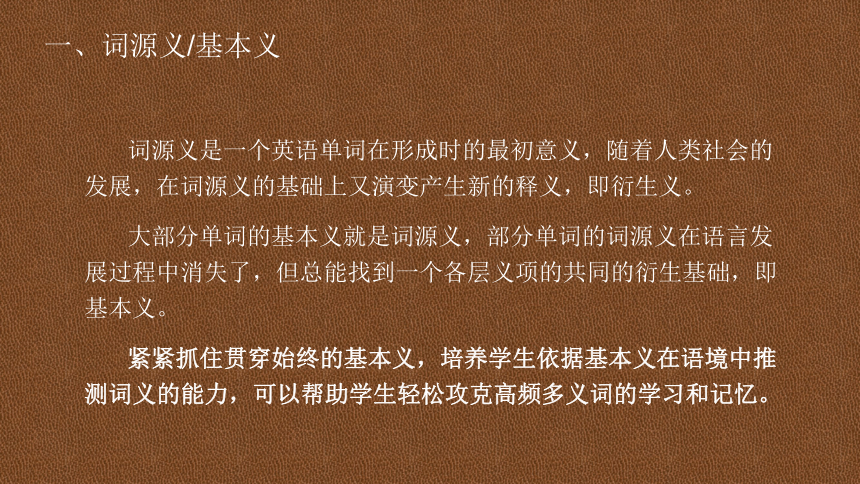
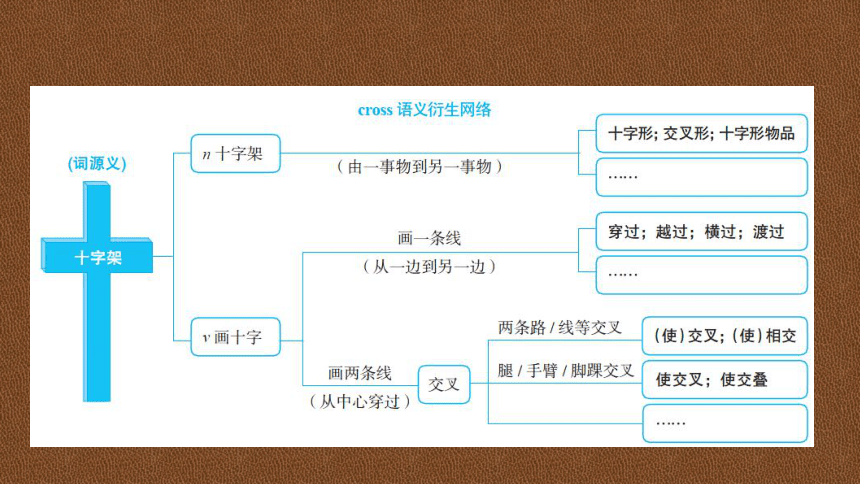
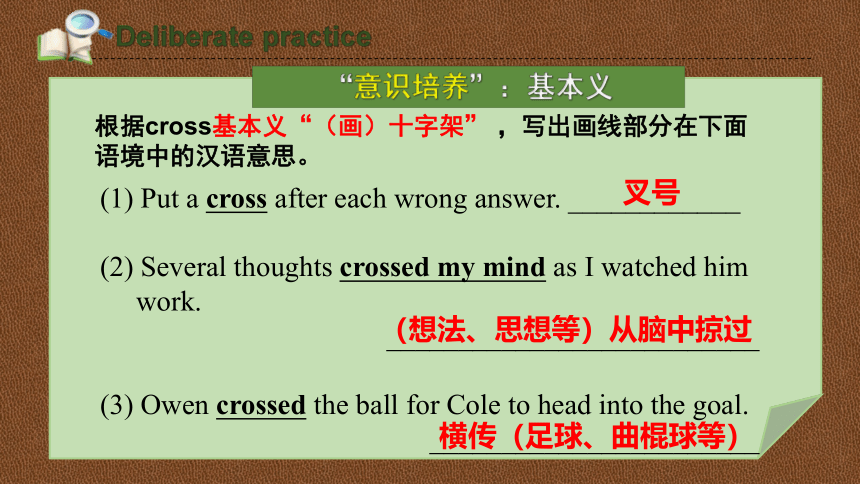

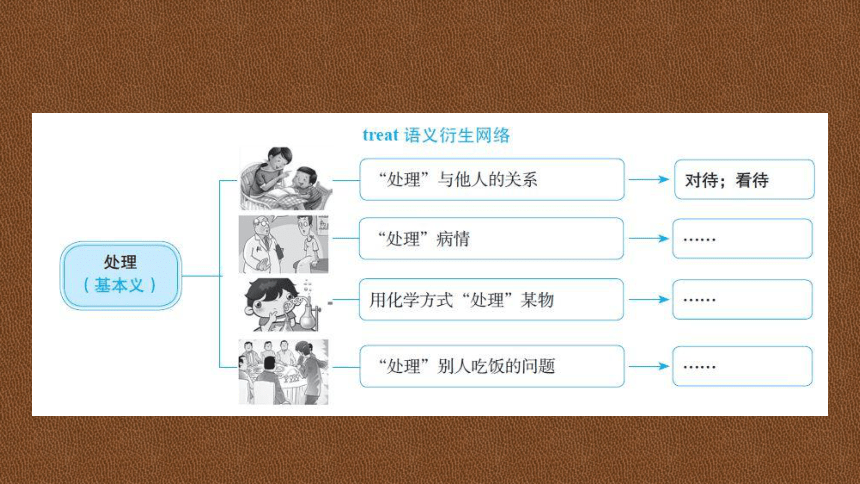
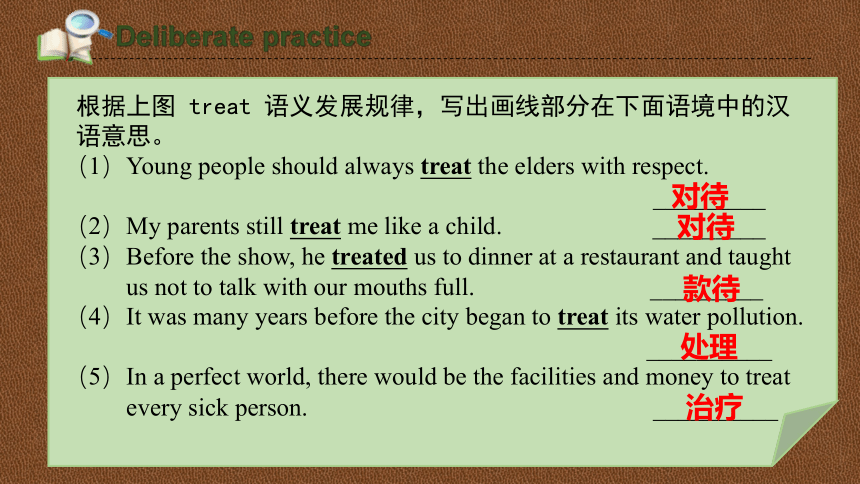
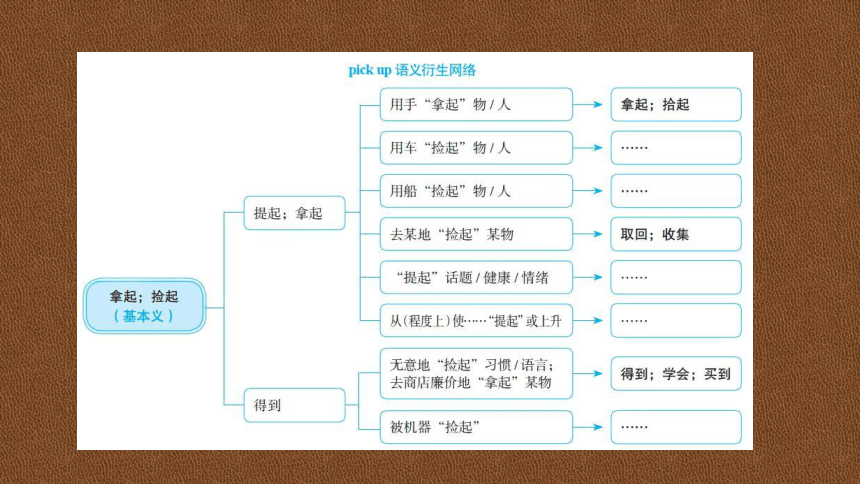
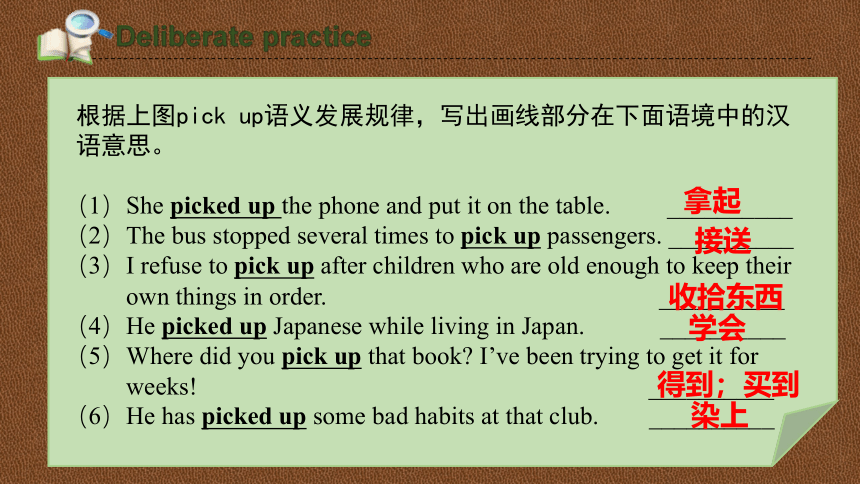

文档简介
(共61张PPT)
高中英语词汇学习必须掌握的
十二个基本概念
一、词源义/基本义
二、词根
三、名词后缀
四、否定前缀
五、词族
六、名词动词化
七、小品词
八、行为抽象名词
九、辨析义
十、英语释义
十一、正式与非正式用语
十二、英汉思维差异
目录
一、词源义/基本义
一、词源义/基本义
词源义是一个英语单词在形成时的最初意义,随着人类社会的发展,在词源义的基础上又演变产生新的释义,即衍生义。
大部分单词的基本义就是词源义,部分单词的词源义在语言发展过程中消失了,但总能找到一个各层义项的共同的衍生基础,即基本义。
紧紧抓住贯穿始终的基本义,培养学生依据基本义在语境中推测词义的能力,可以帮助学生轻松攻克高频多义词的学习和记忆。
“意识培养”:基本义
叉号
根据cross基本义“(画)十字架”
,写出画线部分在下面语境中的汉语意思。
(1)
Put
a
cross
after
each
wrong
answer.
____________
(2)
Several
thoughts
crossed
my
mind
as
I
watched
him
work.
__________________________
(3)
Owen
crossed
the
ball
for
Cole
to
head
into
the
goal.
_______________________
(想法、思想等)从脑中掠过
横传(足球、曲棍球等)
Deliberate
practice
“意识培养”:基本义
Deliberate
practice
根据cross基本义“(画)十字架”
,写出画线部分在下面语境中的汉语意思。
(4)
Cross
Dave’s
name
off
the
guest
list
—
he
can’t
come.
____________
(5)
She
was
sitting
on
the
floor
with
her
legs
crossed.
____________
(6)
I
phoned
him
up
and
got
a
crossed
line.
____________
(7)
Believe
in
them,
and
your
paths
will
cross!
_____________________
划掉;删除
盘(腿)
串线
你们将不期而遇;邂逅
Deliberate
practice
根据上图
treat
语义发展规律,写出画线部分在下面语境中的汉
语意思。
(1)Young
people
should
always
treat
the
elders
with
respect.
_________
(2)My
parents
still
treat
me
like
a
child.
_________
(3)Before
the
show,
he
treated
us
to
dinner
at
a
restaurant
and
taught
us
not
to
talk
with
our
mouths
full.
_________
(4)It
was
many
years
before
the
city
began
to
treat
its
water
pollution.
__________
(5)In
a
perfect
world,
there
would
be
the
facilities
and
money
to
treat
every
sick
person.
__________
对待
对待
款待
处理
治疗
Deliberate
practice
根据上图pick
up语义发展规律,写出画线部分在下面语境中的汉
语意思。
(1)She
picked
up
the
phone
and
put
it
on
the
table.
__________
(2)The
bus
stopped
several
times
to
pick
up
passengers.
__________
(3)I
refuse
to
pick
up
after
children
who
are
old
enough
to
keep
their
own
things
in
order.
__________
(4)He
picked
up
Japanese
while
living
in
Japan.
__________
(5)Where
did
you
pick
up
that
book?
I’ve
been
trying
to
get
it
for
weeks!
__________
(6)He
has
picked
up
some
bad
habits
at
that
club.
__________
拿起
接送
收拾东西
学会
得到;买到
染上
二、词根
二、词根
英语单词构成有其规律,掌握了构词规律,可以高效记忆单词。英语单词构词法的核心部分在于词根,词根决定单词的意思。
词根可以单独构成词,也可以通过加前缀(改变单词词义)或后缀(决定单词词性)来构成新词。
Deliberate
practice
根据以上词根分析示例,写出下列画线单词的汉语释义。
(1)Some
of
the
typewriters
went
to
customers
in
his
own
country,
but
he
exported
more
to
other
countries.
____________
(2)You
should
have
something
ready
just
in
case,
like
a
portable
radio,
a
flash
light,
a
rope,
and
some
candles
and
matches.
____________
(3)Encourage
the
whole
family
to
help
build
a
supportive
environment
that
children
need
for
success
in
school.
____________
(4)He
was
deported
from
the
country
when
his
visa
expired
(到期).
____________
出口
便携式的
反应;回应
把……驱逐出境
三、名词后缀
三、名词后缀
名词后缀,即由某些约定俗成的具有名词特征的词素形成的。把这种后缀加在某个词后边,就可以使这个词变为名词。如表示“性质,状况,行为,过程,总量,程度”的
-ance,
-ence;表示“性质,状态,程度”的-ity;表示“行为,状态,过程,手段及其结果”的-ment,
-tion。
◆
I
want
to
be
on
the
squad
at
the
high
school
level
because
they
win
scholarships
at
state
competitions.
Deliberate
practice
给提示词加上适当的后缀,并用其正确形式填空。
(1)To
live
with
a
heart
full
of
_________
(kind),
I
was
able
to
tell
him
I
was
proud.
(2)All
he
needs
is
a
stick,
a
garden
rake
and
most
importantly,
his
lively
_________
(imagine)!
(3)In
any
theatrical
__________
(perform)
the
actors
are
just
a
small
part
of
the
people
needed.
(4)A
good
_________
(educate)
gives
your
child
a
head
start
in
life.
(5)Workers
in
the
factory
are
encouraged
to
use
the
library
for
professional
__________
(develop).
(6)The
book
bears
several
obvious
__________
(similar)
to
last
year’s
bestseller.
kindness
imagination
performance
education
development
similarities
四、否定前缀
四、否定前缀
◆
Mrs
Martin,
their
elderly
neighbor,
was
unable
to
take
care
of
her
yard,
so
Serena’s
dad
had
volunteered
Serena
for
this
job.
◆
I
can’t
believe
how
some
intelligent
adults
misunderstand
young
people.
在黑体词前加表示否定意义的前缀,并用其正确形式填空。
(1)Do
you
prefer
the
smoking
area
or
____________
the
area,
sir?
(2)In
order
to
keep
healthy,
he
decided
to
change
the
__________
lifestyle.
“意识培养”:否定前缀
Deliberate
practice
non-smoking
anti-
表示“反对,对抗;相反;防
(止)”
dis-
表示“不,否定,相反”
il-
/
im-
/
in-
/
ir-表示“不,非,无”
un-表示“不;相反的状态”
non-
表示“无,不,非”
unhealthy
“意识培养”:否定前缀
Deliberate
practice
(3)“Reduce”
is
formal,
while
“cut
down”
is
_________.
(4)I
don’t
________
him,
but
I
don’t
really
like
him
much
either.
(5)Smoking
is
considered
as
a(n)
_________
habit,
which
may
cause
some
social
problems.
(6)Sarah
was
usually
patient,
but
she
got
__________
after
waiting
for
an
hour
in
the
queue.
(7)In
some
states
the
legal
age
for
drinking
is
18,
so
it’s
__________
to
sell
alcohol
to
teenagers
under
18.
informal
dislike
anti-social
impatient
illegal
五、词族
五、词缀
语言在发展过程中积累了很多发音和意义相通或相近的同源词,不同的同源词可以一组一组地分开,每组自成系统,称为词族(word
family)。一个词族由它的基础形式、不同语法形式和最常见的派生词组成。有意识地按照词族成组成串记忆,将大大提高词汇的记忆效率。
(1)Perhaps
I
can
offer
a
few
words
of
_____________
to
those
who
didn’t
win
any
prize
this
time.
(2)Don’t
let
a
busy
schedule
__________
you
from
making
some
great
changes
in
the
way
you
eat
and
live!
(3)Pick
yourself
up.
_________
is
doing
what
you’re
afraid
to
do.
(4)Stores
notice
that
the
smell
of
baked
goods
_________
shopping.
(5)Why
is
winning
Olympic
medals
so
___________?
encouragement
discourage
Courage
Deliberate
practice
courage,
discourage,
discouraged,
discouraging,
encourage,
encouraged,
encouragement,
encouraging
选出适当的词,并用其正确形式填空。
encourages
encouraging
(6)We
shouldn’t
get
____________
right
after
failures.
(7)Unfortunately,
the
result
of
the
event
is
__________.
(8)
____________
by
his
new-found
success,
Joe
moved
quickly
throughout
the
room.
discouraged
discouraging
Encouraged
Deliberate
practice
courage,
discourage,
discouraged,
discouraging,
encourage,
encouraged,
encouragement,
encouraging
选出适当的词,并用其正确形式填空。
Deliberate
practice
1.
根据词根推测出同族词的意思。
积极分子
相互影响;相互作用
反应;回应
六、名词动词化
五、词缀
在现代英语中,名词动词化的现象非常普遍。名词转化为动词后,常表示具有该名词的活动特点或性质特征的动作。
◆?Many
of
those
who
don’t?bike
do
their
best
to
reduce
air
pollution
by
taking
public
transportation.
◆?Out
of
eight
fruits,
one
pomegranate
was
taken,
and
most
others
were
gifted?to
new
friends.
“意识培养”:名词动化
2.选出适当的词,并用其正确形式填空
fruit,
water,
telephone,
book,
bus
(1)Please
write
or
_________
for
details.
(2)We
were
________
from
the
airport
to
our
hotel.
(3)Maybe
we
need
to
_______
a
taxi
or
just
go
by
bus.
(14
全国听力)
Deliberate
practice
telephone
bussed
book
“意识培养”:名词动化
2.选出适当的词,并用其正确形式填空
(4)Before
they
_______,
I’ll
add
a
big
sign
to
the
yard
to
encourage
sharing.
(5)The
smells
from
the
kitchen
made
our
mouths
_______.
Deliberate
practice
fruit
water
fruit,
water,
telephone,
book,
bus
“意识培养”:名词动化
3.根据句意写出画线部分的汉语意思
(1)Who
is
chairing
the
meeting?
_____________
(2)Don’t
baby
your
child.
_____________
(3)The
escaped
prisoner
was
cornered
at
last.
_____________
(4)Whenever
I
go,
my
little
brother
dogs
my
footsteps.
______________
(5)The
road
snaked
away
into
the
distance.
______________
Deliberate
practice
主持(会议、讨论等)
紧跟;跟踪
娇惯
使走投无路
蜿蜒伸展
七、小品词
七、小品词
我们在学习英语短语动词时,可以借助构成短语动词的同一副词,即小品词的特征规律猜测
/
理解其意思,这种将短语动词网络化是一种不错的学习方法。
◆
I
wouldn’t
have
been
interested
in
the
more
standard
film
critic’s
role,
which
involves
considering
every
film
that
comes
out.
“意识培养”:词汇网络化
Deliberate
practice
(1)Food
supplies
in
the
flood-stricken
area
are
___________.
We
must
act
immediately
before
there’s
none
left.
(12
重庆单选)
(2)By
the
time
the
police
arrived
the
men
had
already
______________________.
选出适当的短语动词,并用其正确形式填空。
A
die
out,
sell
out,
run
out,
burn
out,
clear
out
running
out
cleared
out(迅速离开)
“意识培养”:词汇网络化
Deliberate
practice
(3)Half
of
the
6,000
?
7,000
languages
spoken
around
the
world
today
will
likely
__________
by
the
next
century.
(14
全国阅读)
(4)She
had
fallen
asleep
in
her
chair
and
the
fire
had
________
______.
(5)Mary
went
to
the
box
office
at
lunch
time,
but
all
the
tickets
had
_________.
(09
上海单选)
die
out
burnt
out
sold
out
“意识培养”:词汇网络化
Deliberate
practice
(6)I’d
thought
I
could
___________
till
my
dentist
came
back
from
holiday,
but
the
pain
was
really
unbearable.
(13
重庆阅读)
(7)He
gave
himself
a
new
name
to
hide
his
identity
when
he
went
to
___________
the
secret
task.
(15
湖北单选)
B
leave
out,
drop
out,
spread
out,
hold
out,
carry
out
hold
out
carry
out
“意识培养”:词汇网络化
Deliberate
practice
(8)The
older
children
went
off
to
play
upstairs
and
she
felt
________.
(9)Peter
was
coming
with
us
to
the
theatre,
but
had
to
________
at
the
last
minute.
(10)We
___________
and
began
to
search
through
the
woods.
left
out
drop
out
spread
out
“意识培养”:词汇网络化
Deliberate
practice
(11)To
__________
the
difficult
maths
problem,
I
have
consulted
Professor
Russell
several
times.
(14
陕西单选)
(12)We
must
__________
when
Karl
is
coming,
so
we
can
book
a
room
for
him.
(15
重庆单选)
C
find
out,
work
out
work
out
find
out
out的基本义是“出来;向外”,如果把这一含义看成一个动态过程,则:
A组短语中的out强调的是“空、无”这一结果,故该组短语有“消失,用尽”的含义。
B组短语中的out强调的是“移动的过程”。例如:carry
out
意为“执行”,指按照计划一步一步做出这一动态过程。
C组短语中的out强调的是“无遮蔽,明了”这一结果,该组短语有“弄明白,弄清楚”的含义。
七、小品词
八、行为抽象名词
八、行为抽象名词
英语和汉语之间一个很重要的差异就是汉语喜欢用动词,英语喜欢用名词,特别是大量、广泛地使用抽象名词,而行为抽象名词是常见的抽象名词,在翻译成汉语时,常常与之对应的是“动词”表达。
Deliberate
practice
1.根据所给提示,完成表格。
waste
belief
understanding
Deliberate
practice
2.
将画线部分译成汉语,注意英汉表达的差异。
(1)Failure
to
solve
the
serious
problem
of
pollution
will
lead
to
a
serious
mistake.
_____________________
(2)His
lecture
deepens
my
understanding
of
its
importance.
_____________________
(3)It
is
my
belief
that
we
will
find
a
cure
for
cancer
in
the
next
ten
years.
______________________
(4)Mike
has
made
an
offer
to
teach
us
English.
______________________
(5)I
don’t
like
to
see
so
much
waste
of
food
when
hundreds
of
people
are
hungry.
______________________
解决不了严重的污染问题
使我更深刻地理解了
我相信
主动提出
这么多食物被浪费
九、辨析义
九、辨析义
英语中存在很多意义相近的词,可以通过辨析来正确理解这些词的异同,从而达到能够正确运用的目的
“意识培养”:词义辨析
1.用括号内所给词的正确形式填空,部分词可重复使用
(provide,
offer,
supply)
(1)It
is
reported
that
the
government
has
_________
________
the
survivors
with
food,
clothes
and
medicine.
(2)Literary
books
can
enrich
my
life
and
_______
me
with
great
pleasure.
(12
江西书面表达改)
(3)The
media
________
lots
of
information
to
us
every
day.
Deliberate
practice
supplied
/
provided
provide
supplies
Deliberate
practice
raised
rise
“意识培养”:辨析义
二、用括号内所给词的正确形式填空。
(arise,
rise,
raise)
The
bear
hit
at
the
camera,
cutting
it
off
the
tripod.
I
______
my
left
arm
to
protect
my
face.(14
北京阅读)
2.
It’s
the
easiest
thing
in
the
world
to
miscalculate
how
long
it’ll
take
to
do
all
the
work
especially
when
new
issues
_____.
(13
浙江阅读)
3.
Temperatures
will
____
steadily
towards
the
end
of
the
week.
raised
arise
rise
十、英语释义
十、英语释义
英语中有些词的词义抽象,较难理解,会影响阅读速度和理解的精准度,通过汉语释义很难精准解释,因此需要借助英语释义准确地理解这些词。
◆“Your
courage
and
strength?encourage?us
all,”?she
continued.
Deliberate
practice
选出下列句子中encourage所对应的英语释义。
A.
to
give
sb
support,
courage
or
hope
B.
to
persuade
sb
to
do
sth
C.
to
make
sth
happen
more
easily
(1)The
shopkeeper
actively
encourage
people
to
buy
clothes
in
his
shop.
____________
(2)Her
work
encouraged
many
other
women
to
become
doctors.
____________
(3)Some
computer
games
encourage
violent
behaviour
in
young
children.
____________
(4)The
aim
of
the
movement
is
to
encourage
youngsters
not
to
smoke.
____________
B
A
C
B
十一、正式与非正式用语
十一、正式与非正式用语
正式与非正式用语是指在特定的文体中使用的不同语言。正式文体中通常使用正式用语,包括书面语、正式场合用语,如演讲、论文、报告、通知等。
非正式文体中通常使用非正式用语,包括日常用语、随意场合用语,如家庭谈话、朋友交流等。?
Deliberate
practice
选出下列句子中encourage所对应的英语释义。
A.
to
give
sb
support,
courage
or
hope
B.
to
persuade
sb
to
do
sth
C.
to
make
sth
happen
more
easily
(1)The
shopkeeper
actively
encourage
people
to
buy
clothes
in
his
shop.
____________
(2)Her
work
encouraged
many
other
women
to
become
doctors.
____________
(3)Some
computer
games
encourage
violent
behaviour
in
young
children.
____________
(4)The
aim
of
the
movement
is
to
encourage
youngsters
not
to
smoke.
____________
B
A
C
B
十二、英汉思维差异
十二、英汉思维差异
汉语是以人为中心的语言,一般认为只有人和动物才能活动;而英语母语者经常将物体看作是能够活动的主体,事物可以“说话”“写字”“看到”“拥有”?等等,人与物是平等的。“事物有生命,可以活动”,这是所有英语思考模式中最基本的原理。
◆?Next
to
her
plate
the
woman
found
a
beautifully
lettered
card.
It?read:
“Congratulations,
darling!
...”
Deliberate
practice
翻译下列句子,注意英汉表达的差异。
(1)Look
at
the
sign,
please.
It
says
“No
Parking”.
_____________________________________
(2)My
watch
says
4
o’clock.
_____________________________________
(3)The
pain
woke
me
up
early
in
the
morning.
_____________________________________
请看告示牌,上面写着“禁止停车”。
我的表四点了。
因为疼痛,我一早就起床了。
Deliberate
practice
2.
根据所给提示,将下列句子译成英语。
(1)过去的一年中,这项研究取得了很大进步。(see)
_____________________________________
(2)那条裙子上有两条口袋。
_____________________________________
(3)这个餐厅里有各种各样的汤。
______________________________________
(4)我们学校为学生提供免费午餐。
______________________________________
The
past
year
has
seen
a
lot
of
progress
in
the
research.
The
skirt
has
two
pockets.
This
restaurant
serves
a
variety
of
soups.
Our
school
provides
students
with
free
lunches.
一、词源义/基本义
二、词根
三、名词后缀
四、否定前缀
五、词族
六、名词动词化
七、小品词
八、行为抽象名词
九、辨析义
十、英语释义
十一、正式与非正式用语
十二、英汉思维差异
回顾
感谢观看
高中英语词汇学习必须掌握的
十二个基本概念
一、词源义/基本义
二、词根
三、名词后缀
四、否定前缀
五、词族
六、名词动词化
七、小品词
八、行为抽象名词
九、辨析义
十、英语释义
十一、正式与非正式用语
十二、英汉思维差异
目录
一、词源义/基本义
一、词源义/基本义
词源义是一个英语单词在形成时的最初意义,随着人类社会的发展,在词源义的基础上又演变产生新的释义,即衍生义。
大部分单词的基本义就是词源义,部分单词的词源义在语言发展过程中消失了,但总能找到一个各层义项的共同的衍生基础,即基本义。
紧紧抓住贯穿始终的基本义,培养学生依据基本义在语境中推测词义的能力,可以帮助学生轻松攻克高频多义词的学习和记忆。
“意识培养”:基本义
叉号
根据cross基本义“(画)十字架”
,写出画线部分在下面语境中的汉语意思。
(1)
Put
a
cross
after
each
wrong
answer.
____________
(2)
Several
thoughts
crossed
my
mind
as
I
watched
him
work.
__________________________
(3)
Owen
crossed
the
ball
for
Cole
to
head
into
the
goal.
_______________________
(想法、思想等)从脑中掠过
横传(足球、曲棍球等)
Deliberate
practice
“意识培养”:基本义
Deliberate
practice
根据cross基本义“(画)十字架”
,写出画线部分在下面语境中的汉语意思。
(4)
Cross
Dave’s
name
off
the
guest
list
—
he
can’t
come.
____________
(5)
She
was
sitting
on
the
floor
with
her
legs
crossed.
____________
(6)
I
phoned
him
up
and
got
a
crossed
line.
____________
(7)
Believe
in
them,
and
your
paths
will
cross!
_____________________
划掉;删除
盘(腿)
串线
你们将不期而遇;邂逅
Deliberate
practice
根据上图
treat
语义发展规律,写出画线部分在下面语境中的汉
语意思。
(1)Young
people
should
always
treat
the
elders
with
respect.
_________
(2)My
parents
still
treat
me
like
a
child.
_________
(3)Before
the
show,
he
treated
us
to
dinner
at
a
restaurant
and
taught
us
not
to
talk
with
our
mouths
full.
_________
(4)It
was
many
years
before
the
city
began
to
treat
its
water
pollution.
__________
(5)In
a
perfect
world,
there
would
be
the
facilities
and
money
to
treat
every
sick
person.
__________
对待
对待
款待
处理
治疗
Deliberate
practice
根据上图pick
up语义发展规律,写出画线部分在下面语境中的汉
语意思。
(1)She
picked
up
the
phone
and
put
it
on
the
table.
__________
(2)The
bus
stopped
several
times
to
pick
up
passengers.
__________
(3)I
refuse
to
pick
up
after
children
who
are
old
enough
to
keep
their
own
things
in
order.
__________
(4)He
picked
up
Japanese
while
living
in
Japan.
__________
(5)Where
did
you
pick
up
that
book?
I’ve
been
trying
to
get
it
for
weeks!
__________
(6)He
has
picked
up
some
bad
habits
at
that
club.
__________
拿起
接送
收拾东西
学会
得到;买到
染上
二、词根
二、词根
英语单词构成有其规律,掌握了构词规律,可以高效记忆单词。英语单词构词法的核心部分在于词根,词根决定单词的意思。
词根可以单独构成词,也可以通过加前缀(改变单词词义)或后缀(决定单词词性)来构成新词。
Deliberate
practice
根据以上词根分析示例,写出下列画线单词的汉语释义。
(1)Some
of
the
typewriters
went
to
customers
in
his
own
country,
but
he
exported
more
to
other
countries.
____________
(2)You
should
have
something
ready
just
in
case,
like
a
portable
radio,
a
flash
light,
a
rope,
and
some
candles
and
matches.
____________
(3)Encourage
the
whole
family
to
help
build
a
supportive
environment
that
children
need
for
success
in
school.
____________
(4)He
was
deported
from
the
country
when
his
visa
expired
(到期).
____________
出口
便携式的
反应;回应
把……驱逐出境
三、名词后缀
三、名词后缀
名词后缀,即由某些约定俗成的具有名词特征的词素形成的。把这种后缀加在某个词后边,就可以使这个词变为名词。如表示“性质,状况,行为,过程,总量,程度”的
-ance,
-ence;表示“性质,状态,程度”的-ity;表示“行为,状态,过程,手段及其结果”的-ment,
-tion。
◆
I
want
to
be
on
the
squad
at
the
high
school
level
because
they
win
scholarships
at
state
competitions.
Deliberate
practice
给提示词加上适当的后缀,并用其正确形式填空。
(1)To
live
with
a
heart
full
of
_________
(kind),
I
was
able
to
tell
him
I
was
proud.
(2)All
he
needs
is
a
stick,
a
garden
rake
and
most
importantly,
his
lively
_________
(imagine)!
(3)In
any
theatrical
__________
(perform)
the
actors
are
just
a
small
part
of
the
people
needed.
(4)A
good
_________
(educate)
gives
your
child
a
head
start
in
life.
(5)Workers
in
the
factory
are
encouraged
to
use
the
library
for
professional
__________
(develop).
(6)The
book
bears
several
obvious
__________
(similar)
to
last
year’s
bestseller.
kindness
imagination
performance
education
development
similarities
四、否定前缀
四、否定前缀
◆
Mrs
Martin,
their
elderly
neighbor,
was
unable
to
take
care
of
her
yard,
so
Serena’s
dad
had
volunteered
Serena
for
this
job.
◆
I
can’t
believe
how
some
intelligent
adults
misunderstand
young
people.
在黑体词前加表示否定意义的前缀,并用其正确形式填空。
(1)Do
you
prefer
the
smoking
area
or
____________
the
area,
sir?
(2)In
order
to
keep
healthy,
he
decided
to
change
the
__________
lifestyle.
“意识培养”:否定前缀
Deliberate
practice
non-smoking
anti-
表示“反对,对抗;相反;防
(止)”
dis-
表示“不,否定,相反”
il-
/
im-
/
in-
/
ir-表示“不,非,无”
un-表示“不;相反的状态”
non-
表示“无,不,非”
unhealthy
“意识培养”:否定前缀
Deliberate
practice
(3)“Reduce”
is
formal,
while
“cut
down”
is
_________.
(4)I
don’t
________
him,
but
I
don’t
really
like
him
much
either.
(5)Smoking
is
considered
as
a(n)
_________
habit,
which
may
cause
some
social
problems.
(6)Sarah
was
usually
patient,
but
she
got
__________
after
waiting
for
an
hour
in
the
queue.
(7)In
some
states
the
legal
age
for
drinking
is
18,
so
it’s
__________
to
sell
alcohol
to
teenagers
under
18.
informal
dislike
anti-social
impatient
illegal
五、词族
五、词缀
语言在发展过程中积累了很多发音和意义相通或相近的同源词,不同的同源词可以一组一组地分开,每组自成系统,称为词族(word
family)。一个词族由它的基础形式、不同语法形式和最常见的派生词组成。有意识地按照词族成组成串记忆,将大大提高词汇的记忆效率。
(1)Perhaps
I
can
offer
a
few
words
of
_____________
to
those
who
didn’t
win
any
prize
this
time.
(2)Don’t
let
a
busy
schedule
__________
you
from
making
some
great
changes
in
the
way
you
eat
and
live!
(3)Pick
yourself
up.
_________
is
doing
what
you’re
afraid
to
do.
(4)Stores
notice
that
the
smell
of
baked
goods
_________
shopping.
(5)Why
is
winning
Olympic
medals
so
___________?
encouragement
discourage
Courage
Deliberate
practice
courage,
discourage,
discouraged,
discouraging,
encourage,
encouraged,
encouragement,
encouraging
选出适当的词,并用其正确形式填空。
encourages
encouraging
(6)We
shouldn’t
get
____________
right
after
failures.
(7)Unfortunately,
the
result
of
the
event
is
__________.
(8)
____________
by
his
new-found
success,
Joe
moved
quickly
throughout
the
room.
discouraged
discouraging
Encouraged
Deliberate
practice
courage,
discourage,
discouraged,
discouraging,
encourage,
encouraged,
encouragement,
encouraging
选出适当的词,并用其正确形式填空。
Deliberate
practice
1.
根据词根推测出同族词的意思。
积极分子
相互影响;相互作用
反应;回应
六、名词动词化
五、词缀
在现代英语中,名词动词化的现象非常普遍。名词转化为动词后,常表示具有该名词的活动特点或性质特征的动作。
◆?Many
of
those
who
don’t?bike
do
their
best
to
reduce
air
pollution
by
taking
public
transportation.
◆?Out
of
eight
fruits,
one
pomegranate
was
taken,
and
most
others
were
gifted?to
new
friends.
“意识培养”:名词动化
2.选出适当的词,并用其正确形式填空
fruit,
water,
telephone,
book,
bus
(1)Please
write
or
_________
for
details.
(2)We
were
________
from
the
airport
to
our
hotel.
(3)Maybe
we
need
to
_______
a
taxi
or
just
go
by
bus.
(14
全国听力)
Deliberate
practice
telephone
bussed
book
“意识培养”:名词动化
2.选出适当的词,并用其正确形式填空
(4)Before
they
_______,
I’ll
add
a
big
sign
to
the
yard
to
encourage
sharing.
(5)The
smells
from
the
kitchen
made
our
mouths
_______.
Deliberate
practice
fruit
water
fruit,
water,
telephone,
book,
bus
“意识培养”:名词动化
3.根据句意写出画线部分的汉语意思
(1)Who
is
chairing
the
meeting?
_____________
(2)Don’t
baby
your
child.
_____________
(3)The
escaped
prisoner
was
cornered
at
last.
_____________
(4)Whenever
I
go,
my
little
brother
dogs
my
footsteps.
______________
(5)The
road
snaked
away
into
the
distance.
______________
Deliberate
practice
主持(会议、讨论等)
紧跟;跟踪
娇惯
使走投无路
蜿蜒伸展
七、小品词
七、小品词
我们在学习英语短语动词时,可以借助构成短语动词的同一副词,即小品词的特征规律猜测
/
理解其意思,这种将短语动词网络化是一种不错的学习方法。
◆
I
wouldn’t
have
been
interested
in
the
more
standard
film
critic’s
role,
which
involves
considering
every
film
that
comes
out.
“意识培养”:词汇网络化
Deliberate
practice
(1)Food
supplies
in
the
flood-stricken
area
are
___________.
We
must
act
immediately
before
there’s
none
left.
(12
重庆单选)
(2)By
the
time
the
police
arrived
the
men
had
already
______________________.
选出适当的短语动词,并用其正确形式填空。
A
die
out,
sell
out,
run
out,
burn
out,
clear
out
running
out
cleared
out(迅速离开)
“意识培养”:词汇网络化
Deliberate
practice
(3)Half
of
the
6,000
?
7,000
languages
spoken
around
the
world
today
will
likely
__________
by
the
next
century.
(14
全国阅读)
(4)She
had
fallen
asleep
in
her
chair
and
the
fire
had
________
______.
(5)Mary
went
to
the
box
office
at
lunch
time,
but
all
the
tickets
had
_________.
(09
上海单选)
die
out
burnt
out
sold
out
“意识培养”:词汇网络化
Deliberate
practice
(6)I’d
thought
I
could
___________
till
my
dentist
came
back
from
holiday,
but
the
pain
was
really
unbearable.
(13
重庆阅读)
(7)He
gave
himself
a
new
name
to
hide
his
identity
when
he
went
to
___________
the
secret
task.
(15
湖北单选)
B
leave
out,
drop
out,
spread
out,
hold
out,
carry
out
hold
out
carry
out
“意识培养”:词汇网络化
Deliberate
practice
(8)The
older
children
went
off
to
play
upstairs
and
she
felt
________.
(9)Peter
was
coming
with
us
to
the
theatre,
but
had
to
________
at
the
last
minute.
(10)We
___________
and
began
to
search
through
the
woods.
left
out
drop
out
spread
out
“意识培养”:词汇网络化
Deliberate
practice
(11)To
__________
the
difficult
maths
problem,
I
have
consulted
Professor
Russell
several
times.
(14
陕西单选)
(12)We
must
__________
when
Karl
is
coming,
so
we
can
book
a
room
for
him.
(15
重庆单选)
C
find
out,
work
out
work
out
find
out
out的基本义是“出来;向外”,如果把这一含义看成一个动态过程,则:
A组短语中的out强调的是“空、无”这一结果,故该组短语有“消失,用尽”的含义。
B组短语中的out强调的是“移动的过程”。例如:carry
out
意为“执行”,指按照计划一步一步做出这一动态过程。
C组短语中的out强调的是“无遮蔽,明了”这一结果,该组短语有“弄明白,弄清楚”的含义。
七、小品词
八、行为抽象名词
八、行为抽象名词
英语和汉语之间一个很重要的差异就是汉语喜欢用动词,英语喜欢用名词,特别是大量、广泛地使用抽象名词,而行为抽象名词是常见的抽象名词,在翻译成汉语时,常常与之对应的是“动词”表达。
Deliberate
practice
1.根据所给提示,完成表格。
waste
belief
understanding
Deliberate
practice
2.
将画线部分译成汉语,注意英汉表达的差异。
(1)Failure
to
solve
the
serious
problem
of
pollution
will
lead
to
a
serious
mistake.
_____________________
(2)His
lecture
deepens
my
understanding
of
its
importance.
_____________________
(3)It
is
my
belief
that
we
will
find
a
cure
for
cancer
in
the
next
ten
years.
______________________
(4)Mike
has
made
an
offer
to
teach
us
English.
______________________
(5)I
don’t
like
to
see
so
much
waste
of
food
when
hundreds
of
people
are
hungry.
______________________
解决不了严重的污染问题
使我更深刻地理解了
我相信
主动提出
这么多食物被浪费
九、辨析义
九、辨析义
英语中存在很多意义相近的词,可以通过辨析来正确理解这些词的异同,从而达到能够正确运用的目的
“意识培养”:词义辨析
1.用括号内所给词的正确形式填空,部分词可重复使用
(provide,
offer,
supply)
(1)It
is
reported
that
the
government
has
_________
________
the
survivors
with
food,
clothes
and
medicine.
(2)Literary
books
can
enrich
my
life
and
_______
me
with
great
pleasure.
(12
江西书面表达改)
(3)The
media
________
lots
of
information
to
us
every
day.
Deliberate
practice
supplied
/
provided
provide
supplies
Deliberate
practice
raised
rise
“意识培养”:辨析义
二、用括号内所给词的正确形式填空。
(arise,
rise,
raise)
The
bear
hit
at
the
camera,
cutting
it
off
the
tripod.
I
______
my
left
arm
to
protect
my
face.(14
北京阅读)
2.
It’s
the
easiest
thing
in
the
world
to
miscalculate
how
long
it’ll
take
to
do
all
the
work
especially
when
new
issues
_____.
(13
浙江阅读)
3.
Temperatures
will
____
steadily
towards
the
end
of
the
week.
raised
arise
rise
十、英语释义
十、英语释义
英语中有些词的词义抽象,较难理解,会影响阅读速度和理解的精准度,通过汉语释义很难精准解释,因此需要借助英语释义准确地理解这些词。
◆“Your
courage
and
strength?encourage?us
all,”?she
continued.
Deliberate
practice
选出下列句子中encourage所对应的英语释义。
A.
to
give
sb
support,
courage
or
hope
B.
to
persuade
sb
to
do
sth
C.
to
make
sth
happen
more
easily
(1)The
shopkeeper
actively
encourage
people
to
buy
clothes
in
his
shop.
____________
(2)Her
work
encouraged
many
other
women
to
become
doctors.
____________
(3)Some
computer
games
encourage
violent
behaviour
in
young
children.
____________
(4)The
aim
of
the
movement
is
to
encourage
youngsters
not
to
smoke.
____________
B
A
C
B
十一、正式与非正式用语
十一、正式与非正式用语
正式与非正式用语是指在特定的文体中使用的不同语言。正式文体中通常使用正式用语,包括书面语、正式场合用语,如演讲、论文、报告、通知等。
非正式文体中通常使用非正式用语,包括日常用语、随意场合用语,如家庭谈话、朋友交流等。?
Deliberate
practice
选出下列句子中encourage所对应的英语释义。
A.
to
give
sb
support,
courage
or
hope
B.
to
persuade
sb
to
do
sth
C.
to
make
sth
happen
more
easily
(1)The
shopkeeper
actively
encourage
people
to
buy
clothes
in
his
shop.
____________
(2)Her
work
encouraged
many
other
women
to
become
doctors.
____________
(3)Some
computer
games
encourage
violent
behaviour
in
young
children.
____________
(4)The
aim
of
the
movement
is
to
encourage
youngsters
not
to
smoke.
____________
B
A
C
B
十二、英汉思维差异
十二、英汉思维差异
汉语是以人为中心的语言,一般认为只有人和动物才能活动;而英语母语者经常将物体看作是能够活动的主体,事物可以“说话”“写字”“看到”“拥有”?等等,人与物是平等的。“事物有生命,可以活动”,这是所有英语思考模式中最基本的原理。
◆?Next
to
her
plate
the
woman
found
a
beautifully
lettered
card.
It?read:
“Congratulations,
darling!
...”
Deliberate
practice
翻译下列句子,注意英汉表达的差异。
(1)Look
at
the
sign,
please.
It
says
“No
Parking”.
_____________________________________
(2)My
watch
says
4
o’clock.
_____________________________________
(3)The
pain
woke
me
up
early
in
the
morning.
_____________________________________
请看告示牌,上面写着“禁止停车”。
我的表四点了。
因为疼痛,我一早就起床了。
Deliberate
practice
2.
根据所给提示,将下列句子译成英语。
(1)过去的一年中,这项研究取得了很大进步。(see)
_____________________________________
(2)那条裙子上有两条口袋。
_____________________________________
(3)这个餐厅里有各种各样的汤。
______________________________________
(4)我们学校为学生提供免费午餐。
______________________________________
The
past
year
has
seen
a
lot
of
progress
in
the
research.
The
skirt
has
two
pockets.
This
restaurant
serves
a
variety
of
soups.
Our
school
provides
students
with
free
lunches.
一、词源义/基本义
二、词根
三、名词后缀
四、否定前缀
五、词族
六、名词动词化
七、小品词
八、行为抽象名词
九、辨析义
十、英语释义
十一、正式与非正式用语
十二、英汉思维差异
回顾
感谢观看
